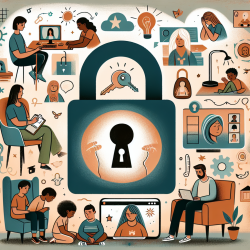The COVID-19 pandemic has underscored the importance of flexible and accessible mental health care solutions. One promising approach is Brief Cognitive-Behavioral Therapy for Suicide Prevention (BCBT-SP) via Video Telehealth, as demonstrated in the recent case study titled Brief Cognitive-Behavioral Therapy for Suicide Prevention (BCBT-SP) via Video Telehealth: A Case Example During the COVID-19 Outbreak. This research offers invaluable insights for practitioners looking to improve their skills and better serve their patients, particularly in times of crisis.
Key Takeaways for Practitioners
- Feasibility and Acceptability: The study showed that BCBT-SP delivered via Clinical Video Telehealth (CVT) is both feasible and acceptable. The veteran in the case study expressed high satisfaction with the structured nature of BCBT-SP and the convenience of CVT.
- High Therapeutic Alliance: Consistent with previous findings, the veteran reported a strong therapeutic alliance with the therapist, comparable to in-person care. This suggests that the therapeutic relationship can be effectively maintained even in a virtual setting.
- Structured Treatment Approach: BCBT-SP uses a phased treatment approach to directly target suicide risk. The structured nature of this therapy makes it easier to implement and track progress, even remotely.
- Emergency and Technical Planning: A pretreatment session was crucial for reviewing CVT guidelines, creating an emergency plan, and troubleshooting potential technical failures. This preparation helped manage crises effectively and reduced the veteran's distress during technical issues.
- Adaptability During COVID-19: The pandemic required adaptations to the veteran's crisis response plan, replacing non-feasible activities with alternatives that could be done at home. This flexibility is a testament to the robustness of BCBT-SP.
Encouraging Further Research
While this case study provides preliminary support for BCBT-SP via CVT, more research is needed to generalize these findings. A randomized controlled trial comparing BCBT-SP delivered via CVT to in-person treatment would provide more compelling evidence. Additionally, training more practitioners in delivering BCBT-SP via CVT is crucial for widespread implementation.
By integrating these insights into your practice, you can offer more flexible and effective care to your patients, especially those who face barriers to in-person therapy. Embrace the potential of telehealth to make a significant impact on suicide prevention.
To read the original research paper, please follow this link: Brief Cognitive-Behavioral Therapy for Suicide Prevention (BCBT-SP) via Video Telehealth: A Case Example During the COVID-19 Outbreak.










